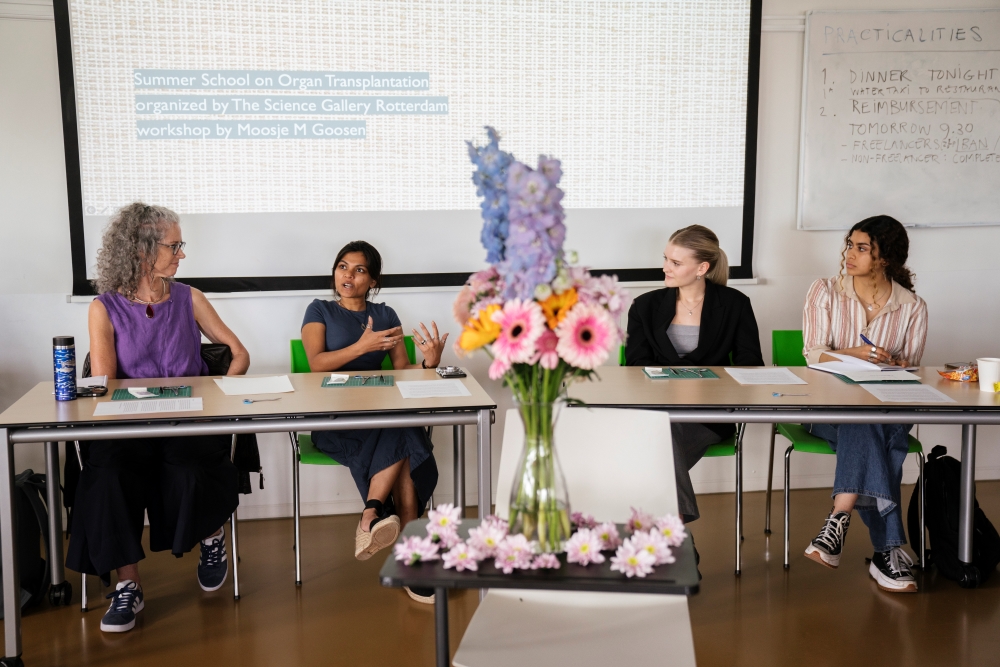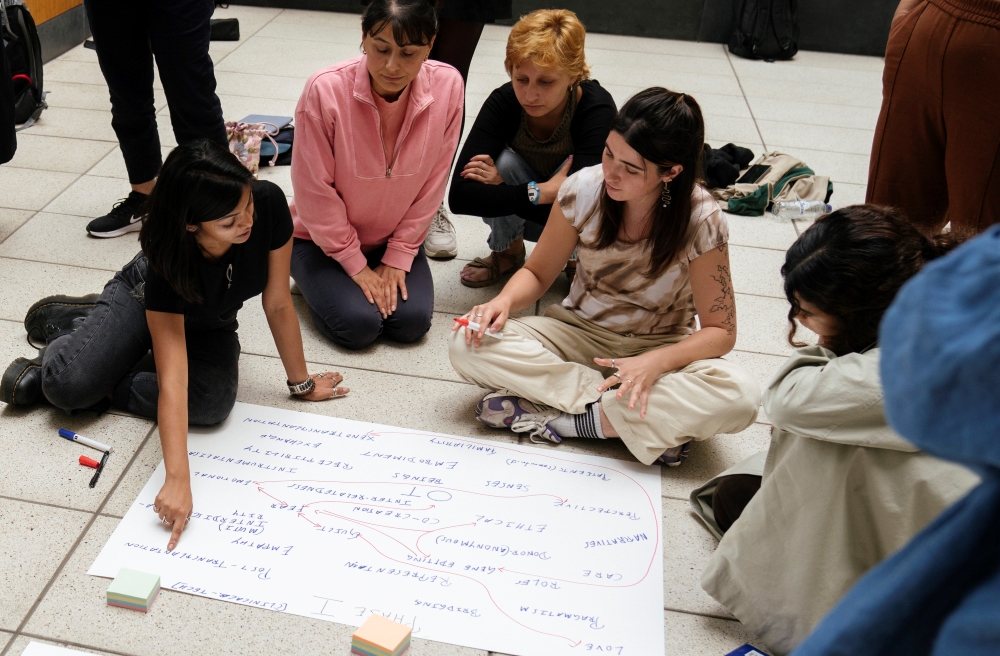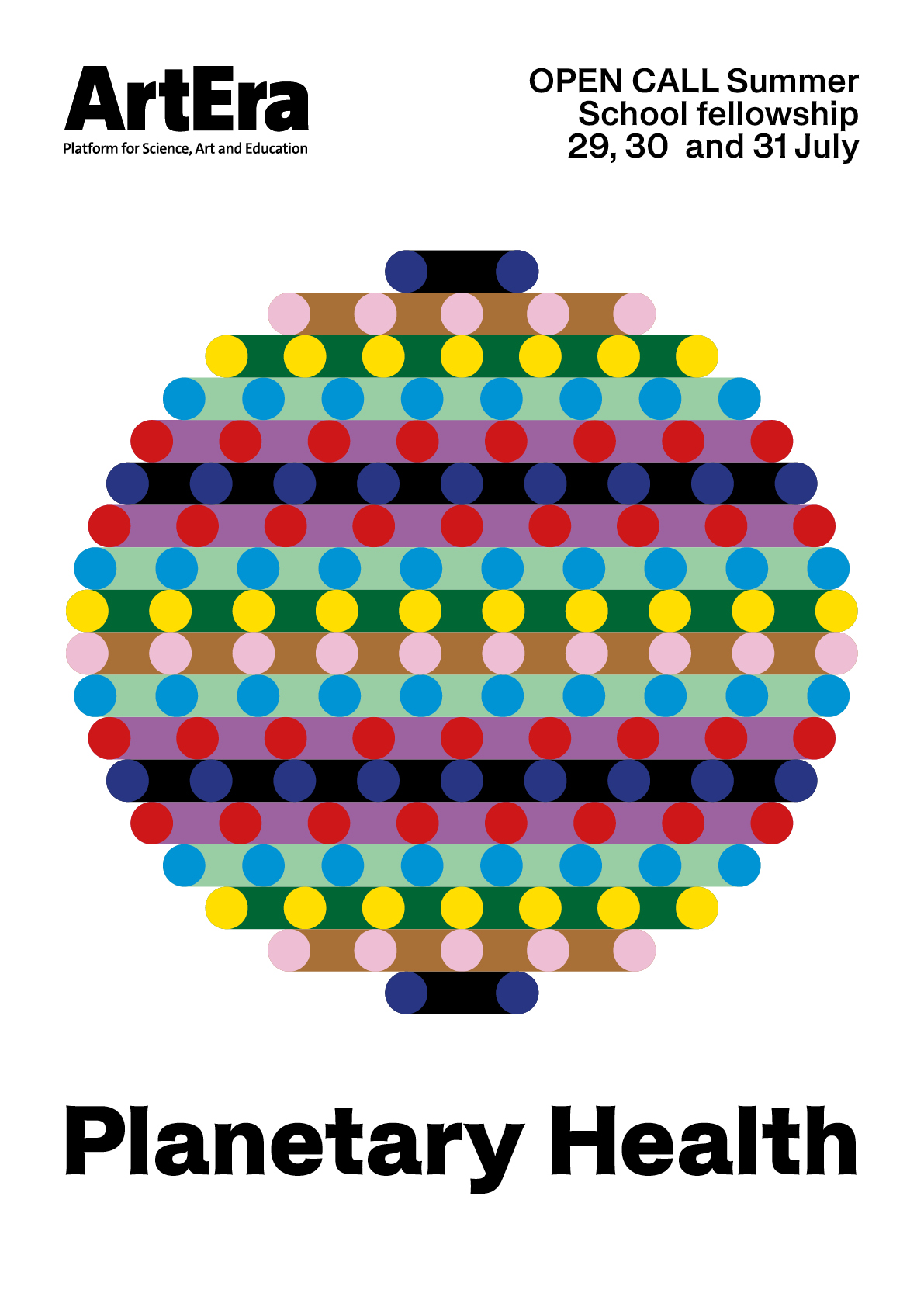ArtEra invites students and recent graduates from all backgrounds to apply for the third summer school held from July 29-31, 2025 at Erasmus MC in Rotterdam. Join us for this exciting three-day program of science lectures, artiststalks, interactive workshops and discussions on the theme of ‘Planetary Health’.
ArtEra’s summer school is a three-day program held at Erasmus MC, where 15 fellows immerse themselves in biomedical, healthcare, and societal topics. Together with researchers, artists, designers, creatives, and thinkers, the fellows explore a theme from various perspectives and enrich the scientific discourse with personal and poetic narratives through talks, discussions, workshops, and collaborations. The fellows will engage with issues that are crucial in their future and could have a lasting meaning in their careers. This year, the focus of the summer school is on Planetary Health.
The results of the Summer School will be presented at Erasmus MC’s public event, Lof der Geneeskunst, on October 3rd and will be elaborated into an exhibition that will open in March 2026 at ArtEra in Erasmus MC.
Summer School Details
- Dates: 29th, 30th, and 31st July 2025
- Times: 09:00 AM - 05:00 PM (approximately)
- Location: Erasmus MC (Dr. Molewaterplein 40, Rotterdam) and various external locations in Rotterdam.
- Language: English
Compensation for the time and expenses of the fellows:
- Students will receive €150
- Young professionals will receive €450
How to apply
Send your motivation letter of max 500 words, CV and portfolio (obligatory for candidates from the arts; optional for candidates not in the arts) before 29 June 2025 to artera@erasmusmc.nl. Use the subject line: "Summer School Application: [Your Name]”). Applicants will be notified in the first week of July.
Eligibility and Submission Guidelines
- The call is open to students in the final two years of a bachelor’s or master’s program across all disciplines—including art, science, design, social sciences, and humanities—as well as to young professionals in the first two years of their careers.
- Submit all documents in PDF format (max 10MB).
- Attendance in Rotterdam for the full duration of the summer school is mandatory.
- Previous fellows are not eligible to apply again.
Selection Criteria
Applicants will be evaluated on the strength of their personal or professional connection to the theme and their ability to articulate it. Prior experience is not required. Final selection will also consider diversity across disciplines, professions, and cultural backgrounds to form a well-balanced group.
About the theme: Planetary Health
The health of humans does not exist in isolation. It is inescapably tied to the health of our planet. For decades, we have witnessed the Earth showing signs of deep illness: blistering heat, rising sea levels, and floods, caused by human exploitation. For many, these effects have remained distant—reduced to fleeting images on screens, stripped of urgency, happening somewhere else. Even theway we speak of them, as symptoms, as a kind of planetary disease, has begun to feel worn, almost cliché.
Yet too little is being done to change course. The consequences are no longer just climate statistics; they’re manifesting in our bodies and daily lives. Allergies and rare diseases rise as microplastics invade our air and water. Birds and mosquitoes carry new diseases to regions previously unaffected. The healthcare system strains under the threat of pandemics, heat stress in urban environments, and air pollution, with the most vulnerable—elderly, pregnant, young, and poor—bearing the heaviest burden. We’re not just witnessing a sick planet; we are living on it.

Photo by Liza Wolters
These examples show that today’s crises—economic, political, and public health—are entangled. The ecological crisis, in particular, crosses all boundaries, defying narrow solutions. It demands collective, interdisciplinary research and actions: the spirit at the heart of the 2025 ArtEra Summer School on “Planetary Health.” A three-day program that merges art and science under the roof of a biomedical research center and hospital.
In conversation with artists, scientists and fellows, we ask; how to (re)connect healthcare to nature? We cast nature as chaotic and medicine as exact, forgetting that healing once emerged from the very ecosystems we now only want to tame. Can these two worlds—clinical and organic—find a shared language again? And as contemporary artistic discourse emphasizes the interdependence of species and elevates non-human perspectives, we ask: how do the ideas of making kin with nature resonate within the walls of a hospital? Do they still hold, or does the urgency of human life inevitably reclaim center stage?
Using research at Erasmus MC as a starting point, we explore the ecological crisis through the lens of healthcare. In a new prevention program, scientists and researchers are engaging in meaningful dialogue about planetary health, anticipating the impacts of climate change, pollution, and biodiversity loss in urban settings, and developing new approaches to treatment and prevention. They’re advocating for “healthy living” through initiatives like promoting chemical-free foods and exercise in green environments—but how does this research actually intersect with industries like agriculture, for example? On a broader scale, could healthcare findings redefine other sectors by placing human health at the center, potentially influencing policy decisions and shifting power dynamics?

Photo by Liza Wolters
It’s impossible to truly grasp the health of a planet when the very idea of a planet feels too complex and vast to comprehend. In this summer school program, we aim to start small—not with the planet, but with our local environment or even a garden, as a more tangible field for change. We take inspiration from the past, specifically 20th century sanatoriums. These prescribed medical retreats for patients with lung diseases, based on rest, fresh air, and nourishing food as the path to healing. Can we reclaim these ideas, not as a luxury reserved for the wealthy sick, but as a baseline for all? A gesture toward restoring balance between human life and the natural world?
ArtEra dives into these questions, refusing to focus solely on decline. It’s a striking paradox: hospitals—institutions devoted to healing—are among the most polluting. We've grown disturbingly used to this contradiction. But every crisis carries the potential for change. Ecological degradation provokes a rethinking of healthcare’s relationship with the natural world. At Erasmus MC, change is already underway, and the summer school will showcase its beginnings. We aim to explore how doctors, researchers, artists, designers, and others can drive this shift, shaping a new vision for healthcare—one that embraces both human and planetary health. We're not leaving this planet anytime soon. Perhaps you, too—like many—choose to stay with the trouble.

